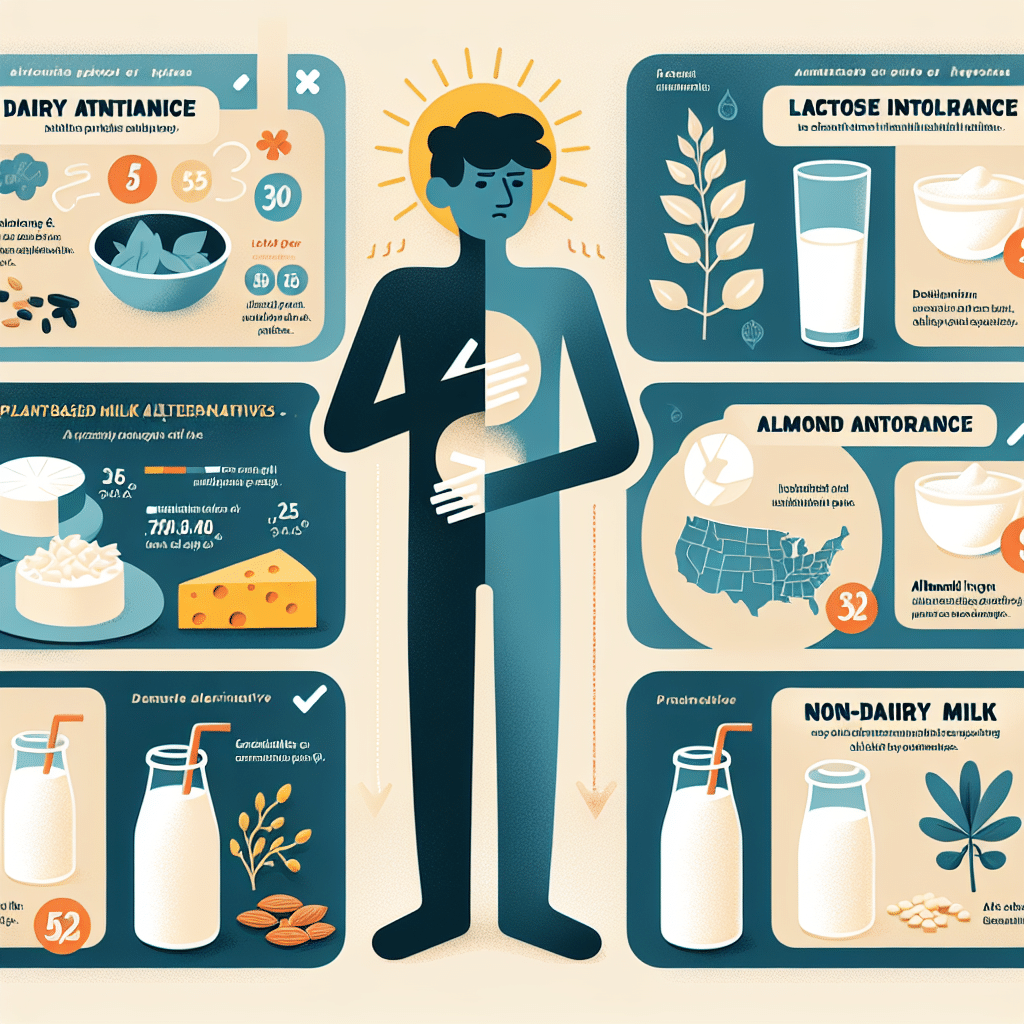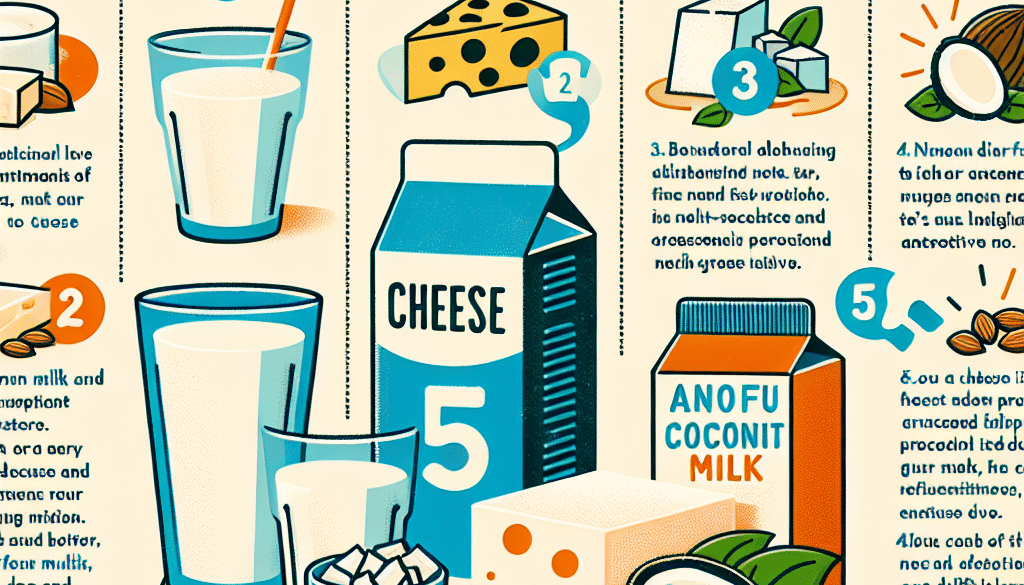5 Things to Know About Dairy and Non-Dairy Alternatives
-
Table of Contents
Dairy and Non-Dairy Alternatives: Essential Insights

As consumer preferences evolve and awareness about health, environment, and dietary restrictions grows, the market for dairy and non-dairy alternatives has expanded significantly. Whether you’re lactose intolerant, vegan, or simply exploring different nutritional options, understanding the landscape of dairy and its alternatives is crucial. Here are five key things to know about dairy and non-dairy alternatives.
1. Nutritional Profiles Vary Widely
One of the most important aspects to consider when choosing between dairy and non-dairy alternatives is the nutritional content. Dairy products are known for their high calcium, protein, and vitamin D levels. However, non-dairy alternatives can have varied nutritional profiles depending on their primary ingredients and fortification.
- Soy Milk: Often fortified with calcium and vitamins, soy milk is the closest to cow’s milk in terms of protein content.
- Almond Milk: Lower in calories and protein but often enriched with vitamins and minerals.
- Oat Milk: Contains fiber and is typically fortified with nutrients, but has more carbohydrates.
- Coconut Milk: Higher in saturated fats and lower in protein and carbohydrates.
It’s essential to read labels and choose alternatives that meet your dietary needs, especially if you rely on them as a primary source of certain nutrients.
2. Environmental Impact Differs
The production of dairy and non-dairy alternatives has different environmental footprints. Dairy farming is resource-intensive, contributing to greenhouse gas emissions, water usage, and land degradation. On the other hand, non-dairy alternatives can also have environmental impacts, though often less severe.
- Almond Milk: Requires significant water use, primarily in drought-prone regions like California.
- Soy Milk: Soy cultivation can lead to deforestation, but sustainably sourced soy has a lower impact.
- Oat Milk: Generally considered environmentally friendly due to lower water and land use.
Choosing products from brands that prioritize sustainable practices can help mitigate these environmental concerns.
3. Taste and Culinary Uses
The taste and culinary applications of dairy and non-dairy alternatives can differ greatly, which might influence your choice depending on the use.
- Cow’s Milk: Known for its creamy texture and neutral taste, it’s versatile in cooking and baking.
- Non-Dairy Alternatives: Flavors can range from nutty to sweet, affecting the taste of your dishes. Some may curdle or not blend as well when heated.
Experimenting with different alternatives can help you find the best option for your recipes.
4. Health Considerations and Allergies
Health concerns and allergies are significant factors in the choice between dairy and non-dairy products.
- Lactose Intolerance: A common reason for choosing non-dairy alternatives, as these do not contain lactose.
- Milk Allergy: Non-dairy options are safe for those with a cow’s milk protein allergy.
- Nut Allergies: Almond and other nut-based milks are not suitable for individuals with nut allergies.
It’s important to consult with a healthcare provider to understand which options are safe and beneficial for your health.
5. Economic Considerations
The cost of dairy versus non-dairy alternatives can be a deciding factor for many consumers. Generally, non-dairy alternatives tend to be more expensive than dairy milk, though prices can vary based on brand, location, and whether the product is organic or conventionally produced.
Considering the long-term economic impact of your choice is important, especially if you consume these products regularly.
Conclusion
In conclusion, when choosing between dairy and non-dairy alternatives, it’s essential to consider their nutritional profiles, environmental impact, taste, health implications, and cost. By understanding these factors, you can make an informed decision that aligns with your dietary needs and values.
Discover ETChem’s Protein Products
If you’re looking for high-quality protein products, ETChem offers a range of collagen options that cater to various industries. Whether you need marine, bovine, or chicken collagen, ETChem provides products with a neutral taste and instant solubility. Ideal for nutraceutical, pharmaceutical, and food and beverage applications, ETChem’s collagens are a great addition to any health-focused diet.
About ETChem:
ETChem, a reputable Chinese Collagen factory manufacturer and supplier, is renowned for producing, stocking, exporting, and delivering the highest quality collagens. They include marine collagen, fish collagen, bovine collagen, chicken collagen, type I collagen, type II collagen and type III collagen etc. Their offerings, characterized by a neutral taste, instant solubility attributes, cater to a diverse range of industries. They serve nutraceutical, pharmaceutical, cosmeceutical, veterinary, as well as food and beverage finished product distributors, traders, and manufacturers across Europe, USA, Canada, Australia, Thailand, Japan, Korea, Brazil, and Chile, among others.
ETChem specialization includes exporting and delivering tailor-made collagen powder and finished collagen nutritional supplements. Their extensive product range covers sectors like Food and Beverage, Sports Nutrition, Weight Management, Dietary Supplements, Health and Wellness Products, ensuring comprehensive solutions to meet all your protein needs.
As a trusted company by leading global food and beverage brands and Fortune 500 companies, ETChem reinforces China’s reputation in the global arena. For more information or to sample their products, please contact them and email karen(at)et-chem.com today.




